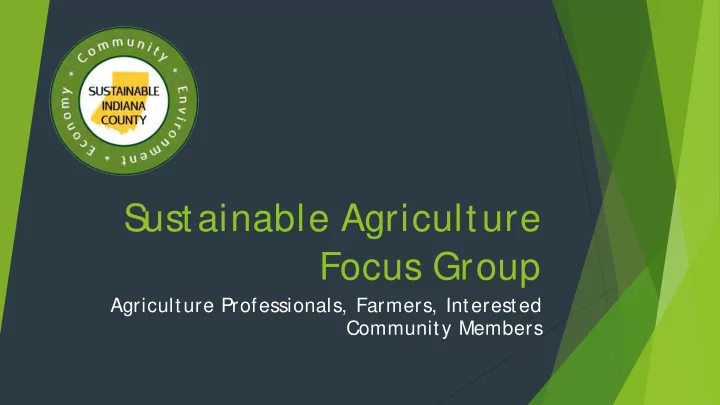

S ustainable Agriculture Focus Group Agriculture Professionals, Farmers, Interested Community Members
Contributing Members Ed Trexler Amy Manko Co-Facilitators: Kay S nyder and Peter Broad Andrew S andeen Barb Barker Bob Livingst on Bob Madden Adam Cotchen Carrie Miller Candice Bolger Carrie Miller Alysha Trexler Darlene Livingston Ed Trexler Hilario Molina II Amy Manko Kay S mith Andrew S andeen Marthe Weyandt Barb Barker S eason Petrovich Bob Livingston Tom Beresnyak Bob Madden Leya Ramer Candice Bolger Pam Bryan
Challenges: Y outh are leaving the county and there is a workforce shortage. Farmers need information and training.
Utilize S ustainable Ag Philosophies to Develop a S killed and Qualified Workforce to Fill Labor S hortages in the Agricultural Arena S ustainable agriculture practices S oil health Agriculture technology Mechanical repair of equipment Apprenticeships Migrant labor options: increase awareness and equip employers Agriculture diversification opportunities Farm safety education Agritourism Ag legal issues: regulations, food safety requirements, leasing Meat cutting and scheduling meat processing
S trategies: Work with community colleges, school districts, agriculture organizations already actively educating farmers, and state-wide organizations to develop educational programs and resources. Ensure widespread publication of programs already available as well as those developed to meet the needs. Develop agriculture incubator. S eek federal, state, county financial resources, grant and sponsorships to fund programs. Media focus to promote agriculture.
Challenge: Indiana County needs to capitalize on its agriculture asset.
Promote Local Agriculture as an Economic Driver in Indiana County Connect children and adults to farms, local fresh produce and farm products (often to purchase), and sustainable agriculture. S hare sustainable ag practices. Information about leasing land to agriculture producers.
S trategies: Publicize existing programs, events and success stories through media outlets. Encourage educational events developed for public and consumers such as farm tours, festivals, farm to table, involving multiple ag organizations as well as more agritourism. Explore school partnerships including: farm to school initiatives, nutrition- based curriculum and experiential learning opportunities, gardening, recycling, Ag in the Classroom Program, Mobile Ag Learning Center, etc. S eek grant funding through US DA Farm to S chool Grant Programs, and others. Workshops and classes for public on leasing, sustainable ag practices, etc.
Challenge: Ensuring the Continued S uccess of Agriculture in Indiana County
Develop and Maintain County Wide Collaborations and S trong S upport S ystems Local & county wide economic development planning and policy documents encouraging sustainable agriculture practices. Reduce pollution, improve water quality, and reduce carbon footprints. S trong networks among agriculture producers, providing support to each other. Farm sustainability begins with succession planning. New, well paying j obs in sustainable agriculture in Indiana County.
S trategies: Work with Office of Planning and Development, Chamber of Commerce and others to develop more priorities related to sustainable agriculture. Publicize farm groups currently meeting in county. Encourage casual meetings of farmers with similar interests. Work with farmers to develop succession plans. Utilize above educational priorities to prepare employees for j obs in sustainable agriculture.
Office to Coordinate Information and Facilitate Action in all Four Areas of S ustainable Task Force S taff to facilitate and implement above items as well as other task force priorities. Develop a county calendar and publicize events already taking place in county and region. Gather data to understand local producers’ marketing strategies. Assess whether certain types of food hubs/ processing facilities might be needed in Indiana County. Promote western Pennsylvania agriculture opportunities.
Recommend
More recommend